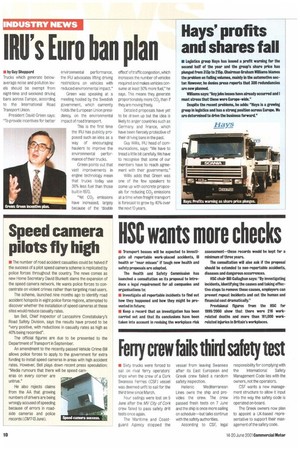11111 s Euro ban plan aHnaydssitiparroefsits
Page 10

If you've noticed an error in this article please click here to report it so we can fix it.
• by Guy Sheppard Trucks which generate belowaverage noise and pollution levels should be exempt from night-time and weekend driving bans across Europe, according to the International Road Transport Union.
President David Green says: "To provide incentives for better environmental performance, the HU advocates lifting driving restrictions on vehicles with reduced environmental impact" Green was speaking at a meeting hosted by the Swedish government, which currently holds the European Union presidency, on the environmental impact of road transport.
This is the first time the IRU has publicly proposed such an idea as a way of encouraging hauliers to improve the environmental performance of their trucks.
Green points out that vast improvements in engine technology mean that trucks today use 36% less fuel than those built in 19/0.
"Yet CO2 emissions have increased, largely because of the 'double effect' of traffic congestion, which increases the number of vehicles required and makes vehicles consume at least 50% more fuel," he says. This means they generate proportionately more 002 than if they are moving freely.
Detailed proposals have yet to be drawn up but the idea is likely to anger countries such as Germany and France, which have been fiercely protective of their driving bans in the past.
Guy Willis, 119L1 head of communications, says: 'We have to tread a little bit carefully. We have to recognise that some of our members have to reach agreement with their governments."
Willis adds that Green was one of the few speakers to come up with concrete proposals for reducing CO2 emissions at a time when freight transport is forecast to grow by 40% over the next 10 years.
































































































